
A |
I was born on the 5th December, 1825, at Milfield, in Northumberland, a large farm occupied by my father, who occupied also the adjoining farm of Flodden, where the Scottish army encamped before the battle of that name. My earliest recollections are of contested elections in which my father took an active part ; also of hearing him make a noted speech in favour of the abolition of negro slavery when Wilberforce was travelling the country.
In 1832 my family migrated to Tyneside, when my father was better known as " John Grey of Dilston."
I was educated at the Grange School, Bishopwearmouth, kept by Dr. Cowan. The first record I have of Durham University is when I went up in October, 1842. I was in the Engineer class, and I have a note that in January, 1843, Mr. Beanlands took us out and taught us levelling and laying down sections. (My eldest son was going from Victoria, British Columbia, to a wedding on a island in the bay, and on the steam boat met Mr. Beanlands, a clergyman, who was going to officiate, being a son of my old teacher). From the 13th to the 19th February was a very hard frost, thermometer 25 degrees, and we skated every day. The term ended on the 22nd of March, and I find I was much in the company of Johnson, Simpson, Whyatt and Bower, of whom I have but a faint recollection, but Ford and Walker Featherstouhaugh I saw much of in after years.
I went up again on the 22nd of April. In that term I took levels and plans from Mungywell to the castle, and drew plans and sections which I was required to show to, and explain to, the Warden and Senate, on the 9th May, for the purpose of laying water pipes. I don't know if ever they were laid.
I spent the month of September with the Rev. John Gibson at Bedlington, who coached me for exam. I went up on the 17th of October. I kept that term in the usual way.
January, 1845. Term began on the 18th, but I did not go up, professing to read at home, as I was changing from engineering to classics, though I spent much time hunting and otherwise amusing myself.
On April 19th, term began and I went up.

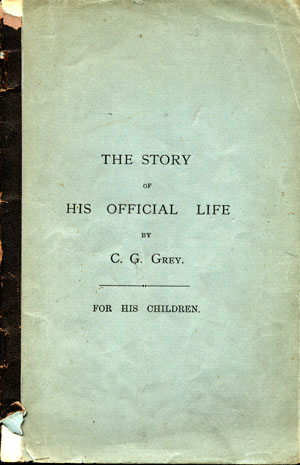


"His Official Life" continued
1855. The Tipperary Farming Society established by Lord
Stanley when on a visit to me, and for which I acted for some years
as Hon. Secretary.
Towards the end of this year, the Roman Catholic Bishops and Priests ordered all the scripture extracts which had been for many years in the schools to be removed, and if the manager refused them they would take all the children away.
1856. At the end of May I went with a party to Judge at the
Great International Cattle Show at Paris, and returned on June
10th. I took a large tillage farm in the County of Limerick on
lease, and made a good profit out of it for some years when prices
were good.
In October, Stafford O'Brien appointed me Agent for his Irish Estates. He lived at Blatherwicke Hall in Northamptonshire. His son Augustus Stafford, Sec. to the Admiralty, made me Agent to his Estate at Cratloe in County Clare.
1857. At the Spring Assizes I had charge of Mr. Stafford's
defence in a trial by the Limerick Fishery Board and the River
Commissioners, to do a.way with his stake weirs at Cratloe.
Eminent council on both sides, and most interesting evidence going
back to Kin« John. Mr. Stafford won his case.
At the end of March I spent five days with Earl Fitzwilliam at Coolattin, County Wicklow, to consult and advise his steward about farming, and the way to keep the accounts.
In July and August, Major Widdrington was managing the affairs of his sister, Mrs. Smith Barry, for whom he is trustee, mother of the present Lord Barrymore. Widdrington is now
living at home at Newton-on-the-moor, near Felton. His name appears in the Durham University calendar as Shalcross Fitzherbert Jacson.
1858, 1859, I have acted at shows as judge of cattle, sheep and implements at about ten or more towns in Ireland, and in July and August in the latter year, spent a week with Lord Fitzwilliam's family at Coolatten, with Fred. Ponsonby, afterwards Lord Bessborough, going over many farms to report to Lord Fiiztwilliam for prizes. After this I had much trouble about the murder of one of Lord Derby's tenants, when none of the people who knew the murderer would give any evidence. The same year I travelled over many countries with others, judging cottages for gold medals for the Royal Agricultural Society.
In 1861, I was appointed Agent to Mr. Chester's Estates.
In 1862, the Agent having died, I attended a meeting of the Governors of the Estates of Erasmus Smith, when 20 of the Governors being present I was elected Agent. These estates were in Tipperary and Limerick chiefly, but some in Meath and Galway, and I had also to inspect the schools and buildings for repairs, etc.
On February, 16th, 1863, I heard that the Duke of Somerset had appointed me Receiver for the Northern Estates of Greenwich Hospital, in succession to my father, who retired on a pension after 30 years service. On February, 26th, I attended a meeting of the Commissioners at Greenwich, when a warrant appointing me was signed, and on the 27th I waited on Lord Derby, who expressed his regret that I was leaving him after so long and satisfactory service, but wishing me success in my new position. During my residence at Ballykisteen in his Lordship's house, Lord Stanley (who was the late Earl of Derry), twice paid me a long visit, going over the estates with me, and during his first visit he established the Tipperary Farming Society. From this time I was passing back and forward between Ballykisteen and Dilston and London, till I was finally installed at Dilston on, June, 16th, to take up my work from my father, and bring my family over. My brother-in-law, whom I had trained, was appointed to succeed me in the agencies of Lord Derby and Stafford O'Brien.
From Dilston I went in 1864 with my brother and his wife to Holland, 12 days and by Brussells.
1865, January, 1, I qualified as a county magistrate for Northumberland.
2. October 24th, I went up for term. Went home on the 20th December.
1846, I went up on January 19th, but term did not begin till the 24th.
On April 13th, I went up with Mr. Dwarris from Bywell, and on the 19th, there was a fire in the buildings where the laboritary was, and an Irishman called Fitzpatrick sat across on the roof with the hose to keep the fire from the chemicals. We got it out at 2 a.m., and were treated to a glass of ale at the buttery. Term did not begin till the 25th, B.A. and Poll Exam, from 10th to 18th. Prof. Chevalier told me I had passed 2nd class in Mathematics for B.A,, and the regatta at which I was steward, 23rd at convocation, I had B.A. conferred.
On the 23rd of October I went up for the term. In the middle of December, the year the trains were all stopped for several days, and men who went to Bishop Auckland for ordination returned in an omnibus with five horses. Also Mr. and Mrs. Whitley got as far as Brockley Whins, and as the telegraph had been recently erected and there was no one to operate it, Mr. Whitley exercised his ingenuity and worked it till he got a response, which was a great feat, as the system was then primitive. I went down on the 19th and spent Sunday with Robertson at Gateshead Fell where he was curate. I have never heard of him since, but I have a vivid picture of his face in my mind, and that I was reminded of it when I saw Lord Dundreary acted.
January, 1847, the 23rd, went up to college. March 22nd went down.
April the 10th, I went up. On the 24th, term began ; found all the old screen in cathedral taken down, which is a great improvement to view of cathedral.
26th, the Senate met, and in consequence of fever in the town would allow men to go down. Many went.
May 4th, convocation, when degrees were conferred and the men in the gallery clapped Philip Rudd, and the Warden told them to keep quiet.
On the 18th I made a note that wheat was 120 shillings a quarter. If it had continued at that my subsequent farming would have been more profitable.
June 16th, Henry Parr Dwarris came back from Bywell. where he had preached his first sermon, and where he was afterwards drowned.
3.
14th, M,A. Exam, began. I had some curious notes about different men in the Exam. I was taken ill and allowed AEgrotat Degree, though I had to go in, ill as I was, for one or two papers, which I suppose I passed.
21st and 22nd, the regatta at which I was steward, but performed only part of my duty being still rather unwell.
My diary from which I have taken these dates contain many curious recollections of men, many of whom I can scarcely recall, and many whom I knew well I have never heard of since. With some I kept up a friendship and exchanged visits for many years, but few of them remain alive.
During the rest of this year, 1847, I travelled about and visited friends in England and Ireland. On my return from Ireland in December, I received an order from the Commissioners of Greenwich Hospital to revise all the maps of their estates in the north, and bring them up to the present date, there not being any ordinance maps then. I began surveying for this work on the 20th, on the Soremerston estate near Berwick.
1848, this year was mostly spent in the surveys and working
on the plans, but much of it in travelling and visiting friends. I
found C. Thornton settled as curate at Meldon. I also called to
see Jack Edwards at Bernard Castle, where he was curate, but he
was away. Saw the church at Staindrop which Harry Lipscombe
had been restoring. Saw James Richards at Bishop Auckland,
who showed us about the castle and chapel where the new
windows had been put in, Also met Ford in Durham. All
this occurred during a carriage drive. My father took me and two
sisters from Alston down Teesdale and Durham. Later saw
Tommy Monson at Longhoughton where he was curate, and with
him dined with Captain the Hon. Frederick Grey. November 4th,
Billy Hill came to be curate at Corbridge.
1849, in February, I went with two sisters to stay at
Mr. Whitley's, and on the 6th had my M.A. conferred at
convocation, along with Green, Coombs, Earskine and Waite.
During 1848 and the spring of 1849,1 made the necessary surveys of changes on the Estates of Greenwich Hospital, and laid them on the Estate Maps, I also made an underground survey of an old coal mine on Tyneside, to be laid on maps of the surface for purposes of a law suit between the Commissioners of Greenwich
4
Hospital and Sir Edward Hackett, about whether the coal had been worked over the boundary of the royalty.
Having been paid by the G. H. Commissioners, I proceeded to spend the money by sailing from the Tyne in the first screw steamer that entered the Baltic, on the 11th May, 1849, and landed at Elsinore. crossed to Gottenburg, and by land to Wexio, and under the guidance of my host who was a Forest Master I studied the management of Government forests. Thence, with my friend the Forester by easy stages to Carlscrona, the naval base of the Government, staying at big houses, where we saw the inner life of the country gentry. In July from Carlscrona to Caluiar, and so by the Baltic steamer among the islands and canals to Stockholm. I went all round the district examining buildings, antiquities and the agriculture and manners. From 16th to 18th I spent at Upsala, where there is a university, and had long mathematical talks with Professor Malmsten, and met other professors and was hospitably received by their families I saw curious antiquities, and a speaking statute of Lineus with a book of botany in his hand. In returning to Stockholm I visited Stokloster, the seat of Count Brahe, the representative of Tycho Brahe and of General Wran gel of the Thirty Years War.
On the 22nd I went to the English chapel, and the chaplain, a Cambridge man, preached about Seven Wise Men, “ of whom he is not one.” I noted in my diary.
28th, I went through the Zoological Museum where Berzelius lived.
30th, I went with the English chaplain to Upsala and on to Danemora, and called on Baron Tamm, a mine owner, who described the manner of smelting and steel making and then to the great mine which we descended in a basket hung from a crane down 690 feet, and saw the working of iron ore, and found snow still lying. We dined with the Baron and went on to Skejerplinge.
On August 1st, saw the falls of Elfkalby, a minature of Niagara, and saw the refining and hammering iron into bars for England.
On the 2nd went on board the steamer for Stockholm. Though the chaplain had been in Sweden for a year or more I had to interpret for him all the time.
4th August I returned to Stockholm. On the 12th left Stockholm by the steamboat which goes through lakes and canals to Gottenburg. I broke the voyage on the 14th at Venersborg. There I visited an Agricultural School, saw the Geological Formation clearly exposed by a round hill, where seven strata are distinctly shown—called, " Kina Kulle." I also explored all the great falls of Trollhata. On the 21st I joined the steamer and arrived at Gottenburg next day. Arrived at Christiania on the 28th On the 29th Consul Crow gave me a letter inclosing one from Lord Palmerston as an introduction to Sir Thomas Cartwright, which had been opened by mistake by Ralph Grey, M.P., for Tynemouth.
On September 1st I started in a carriole I bought, and with it and boats travelled to Bergen, 310 miles. From 6th to 12th spent in Bergen with profit and amusement. From 12th to 14th in steamer which they call " Dampshift," to Molde. Thence to Jerken, but as it had snowed and I crossed footprints of many wolves and had no winter clothes I turned south instead of ascending Sueahetton, and travelled by the inland route by Gooldbrandsdahl to Christiania, about 240 miles, arriving on the 23rd. Spent a few days there and then to Gottenburgh, where I delivered letters to Ralph Grey, which I picked up in Norway after he had left. I then went to Copenhagen, where I remained till October 7th, having met many travelling friends and some English. Arrived at Hamburgh on the 8th. There I staid till the 12th, meeting friends. Arrived in the Tyne on the 15th and went home. November 28th, I began a survey of Milfield farm for my brother to make a plan about 1,000 acres.
1850, I began to be a "Mud Student" with my brother at
Milfield, and kept a "Mud Diary." While I continued as such I
was appointed an Assistant Drainage Commissioner by Lord
Morpeth. The rest of the year I was laying out and inspecting
Drainage Works in Northumberland, Durham, Berwick and
Roxburghshire.
1851. Besides the work stated in the preceding page I spent a
short time in London and at Oxford, and on July was at Commeration. Thence by Lincoln, Hull and Belford, looking at
wonderful crops of wheat. Thence to Knowsley to see Lord
Derby's agent. In August I went from Liverpool by sea to
Glasgow. Thence by Perth and Inverness, and arrived at Thurso
on the 5th, at which I judged cattle and sheep by invitation of the
Society. Then to Pentlandfirth, and so by Lough Lomond and Glasgow back to Milfield.
The greatest wheat year, the crops in England and Scotland wonderful.
On August 30th, having been appointed Agent to Lord Derby's Irish Estates I went to Knowsley, and was kindly entertained by the family, meeting the Bishop of Chester, and being advised by Lord Derby to eat plenty of pancakes to resist the sea. On the 20th took up my quarters at Ballykisteen as agent. After a week with the former agent I returned to England till the end of September, when I returned to Ballykisteen and began regular work. I was appointed a J.P. and attended Board of Guardians.
1852, 1853, 1854, I lived at Ballykisteen, near Tipperary.
Charles Grey Grey of Dilston M.A. University College Durham
Born 5 Dec 1825 at Milfield Hill
Married (1) Emily Bolton 12 Oct 1852. She died 31 May 1864.
Married (2) Eliza Jemfrey 21 Jan 1874
Died 27 February 1915 in Dublin

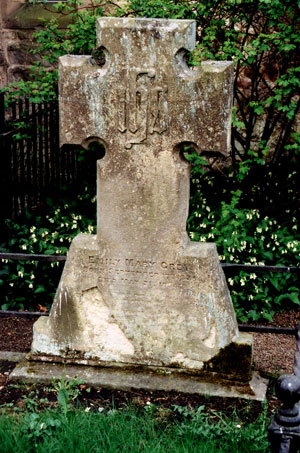
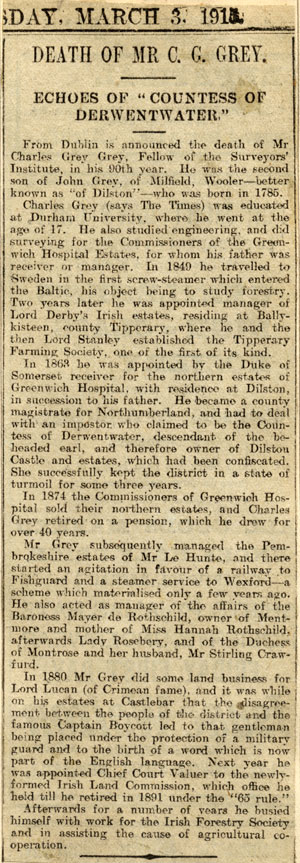
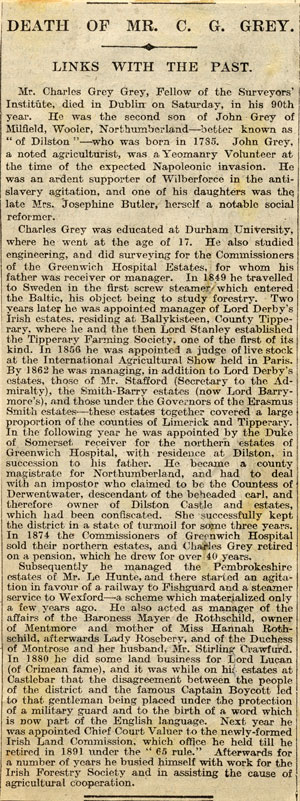
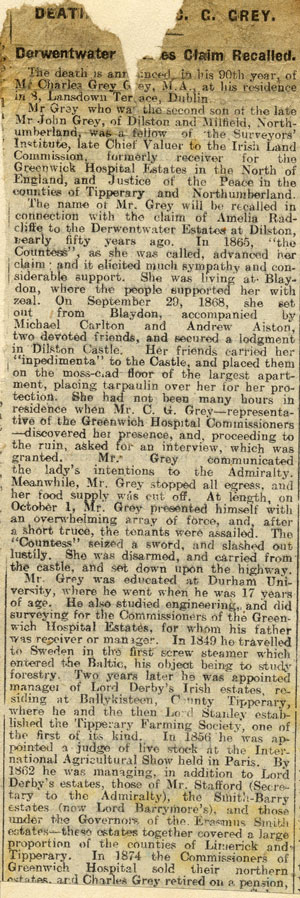
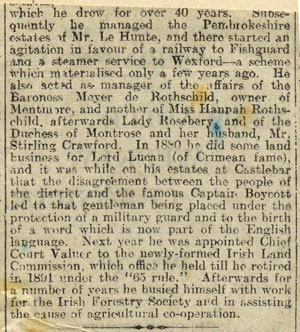
Charles' son C.G was editor of the Aeroplane magazine.
Berwick Advertiser, Thursday, March 4, 1954. Pages 1-10, on page 10. The Listener In-Comments: Through the Air. Mr. Charles Grey, founder and Editor of the “The Aeroplane” magazine died recently, and a memorial service was held at Christ Church, Down Street, London. Probably only a handful of magazines have ever contained news of such great importance as “The Aeroplane”. Founded in the days when aircraft were still regarded as a wonder of the world, it has painted the story of the phenomenal march of air power through the last 15 years. It has seen the change from bi-planes to monoplanes and on to the latest jets. And its guiding light through all these years has been Mr. Grey. He was its Editor for a long period, and Royal Air Force Officers, members of his staff and other air correspondents were among those who attended the service. The Rev. Howard Marshall officiated, and an address was given by Marshal of the Air Force, Lord Tedder. Mr. Grey had a slight local connection, for his Aunt was Mrs Josephine Butler, the social reformer. And Mrs Butler was born and spent her youth at Milfield Hill, just a few miles from Berwick. Mr Grey’s grandfather lived for many years at Dilston, near Corbridge, and was always known as “John Grey of Dilston” A grandchild of Mrs Josephine Butler is Miss H Butler, who lives at Glenhetha, Wooler.
8
1867, August, 16th, I was examined at great length before Mr.
Du Cane's Committee, on Greenwich Hospital Estates and
Management.
1868, August, I judged Shorthorns at the Royal Lancaster
Show with Tom Booth and William Torr, two great Shorthorn
authorities. In October same year the troubles began by an imposter calling herself Countess of Derwentwater, which kept the
district in a turmoil for years. She took possession of the ruins of
the castle of Dilston, and when put out camped on the road for a
long time.
1870, she took possession of a farm and sent the stock for sale by auction at Consett, and being protected by a mob, chiefly Irish workmen, the police could not prevent it, so I came home after looking for them.
January, 20th. I attended a special meeting of the Lord's of the Admiralty, also present their solicitors, and received instructions. Travelling and working night and day meeting lawyers and witnesses. An Assize trial came on at Newcastle, under Justice Brett, when the case was led by Mr. Huddleston, K.C., who was cross and overbearing. The prisoners pleaded guilty after the Crown evidence, in which I was witness, and bullied by Huddleston as if I were a hostile witness. Brown, her ''ladyship's bailiff" got three months imprisonment, and the others let out on their own recognisances.
On April, 29th, I was examined by a Committee of the House of Commons on " Local Taxation." About this time emissaries from the Admiralty were constantly coming down about the proposed sale of the estates and throwing difficulties in the way of management, and evidently the permanent officials were making as much as they could in their own interests as appeared in their subsequent proceedings,
On the 26th August, Mr, Edmund James Smith, a distinguished surveyor, came down engaged by the Admiralty to go over the estates and report to them.
On September 9th, Lord Camperdown, junior lord, came with Mr. Smith, beginning at Berwick, and causing Mr. Smith to write to me that I should not attend him. This was considered by land agents an insult to me, but his Lordship was young and inexperienced. He spent twelve days going about, and I heard from tenants questions he had been asking about me,
9
1870 Lord Camperdown and Mr. Smith came to my office and he questioned me on many points, and complained that I seemed much reserved and unfriendly. I assured him I answered all his questions frankly and honestly, but after the way he had treated me by going behind my back picking up information from tenants, he could not expect me to be cordial. I asked him to come into my house for lunch as it was on the table. He declined, but Mr. Smith said he wanted lunch and begged his Lordship to excuse us. Lord C, took the hint and came with us, but would not eat anything. After this he made peace with me by assuring me that he meant no discourtesy to me, that he was highly pleased with every thing he had seen and heard, and highly approved of my management.
1871, on Feb. 20th, I had to attend an assize trial of a tenant and a shopkeeper for removing crops that had been distrained on. Baron Martin Judge, and won the case. March 25th False Countess of Derwentwater made bankrupt, but kept on frightening tenants on April 17th and other days.
During this year I began with Rev. E. B. Dwarris agitating for establishment of a middle class school, canvassing the country and holding meetings, and after trying to have it under Shaftoes Charity at Haydon Bridge, it was finally established at Barnard Castle after I had left the country.
1872 I joined the Northern Institute of Mining Engineers.
After many journeys and meetings to help the special agents and auctioneer, they sold on August 6th, at Newcastle, two estates for £196,000.
The Rural Sanitary Authority was established of which I was a member, and by attending meetings and making inspections and reports helped it on.
1873. To London, and Feb. 25th met Lord Camperdown, and found that Mr. Smith had been making arrangements with colliery tenants and Viewers without my knowledge. Another snub by officials.
On 26th to Greenwich, and found conveyance of Spittal railway which they had not been able to find.
May 8th to Lord C.
May 9th, again to Admiralty, meeting Lord Camperdown and the First Lord and the Secretary and Mr. Smith, and had long consultation.
10
On the 31st Mr. Smith again to Dilston, arranging particulars of sale.
June 11th, again to London and long meeting with six or seven officials relating to sales.
1873, June 13th, with the Lord of the Admiralty and then Driver the auctioneer, correcting proofs of particulars of sale.
May 4th, 5th, 7th and 9th, correcting maps made by men sent down from London who did not know the country and were well paid for what could have been done in my office by me, at less trouble than it cost me to correct theirs.
But to find work and pay for officials and their friends and to ignore my knowledge is the present habit of their Lordships.
August 5th, Driver, Smith and Bristow the Solicitor, sold at Newcastle, one of the Estates for £225,000. Afterwards wood valuers and others about the estates valuing standing timber.
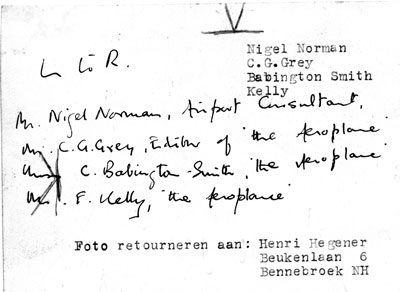

Charles Grey Grey, or C G as he was known (13 November 1875 – 9 December 1953), was the founding editor of the British weekly The Aeroplane and the second editor of Jane's All the World's Aircraft. Among many honors, he became an honorary Companion of the Royal Aeronautical Society. Grey was born on 13 November 1875 and educated at the Erasmus Smith School in Dublin and as an engineer at the Crystal Palace School of Engineering. Grey's first job was as a staff writer for The Autocar. His secondary role as the magazine's aviation specialist resulted in a commission from Iliffe and Sons, Ltd. to edit a penny weekly aviation paper called The Aero. In 1911, in partnership with Mr E V (Later Sir Victor) Sassoon, Grey founded The Aeroplane, remaining as editor of the influential weekly until November of 1939. He was a man of decided opinions as evidenced in his editorials for the magazine over three decades. Grey took over as editor of the annual issues of Jane's All the World's Aircraft from 1916 to 1940. After leaving The Aeroplane, Grey served from 1939 as air correspondent of The Yorkshire Evening Post and the Edinburgh Evening News as well as various overseas journals. Grey also wrote a number of aviation books including A History of the Air Ministry (1940), The Luftwaffe (1944) and The Civil Air War (1945), the latter an opinionated review of likely post-war airline development and Britain's role in that process. "Anyone who read C G in the 'twenties and 'thirties without having met him might have supposed his critical references, and sometimes perverse and acid comments, reflected his nature and personality. Nothing could have been further from the truth. As long as we knew him he was a gentle and kindly man, always charming and generous to his friends, among whom he numbered rivals. Today there are men on Flight's staff who recall a kind word of encouragement here or a spot of advice there from the one-and-only C G, particularly when they were taking their first tentative steps in the hard and competitive world of journalism. His goodwill continued to be reflected in frequent correspondence. From the first to the last occasion upon which we talked to him, he never once failed to express either an original thought or to reveal an unexpected viewpoint on some current topic. Neither his writing nor his conversation was ever lacking in humour and regardless of one's age." - Flight Magazine, 18 December 1953, published after Grey's death on 9 December 1953.[1] From : http://en.wikipedia.org/wiki/C._G._Grey
As airman, journalist and British subject, Charles Grey ("Center of Gravity") Grey is a bird rare as the wingless kiwi. Editor since 1911 of Britain's well-informed trade weekly The Aeroplane, he seldom stuck his balding head inside one, when he did, prayed it would "land slowly and not burn up." In a publication ostensibly technical, aerophobic Editor Grey devoted whopping columns to his pet political peeves and peevish political pets. He was shrilly pro-Nazi, anti-French, abominated U. S.-made planes, roundly clapperclawed the British Air Ministry for buying them. A colorful penman with spectacular contempt for fact ("What's the good of that when you can invent your facts as you go along?"), führious Editor Grey perennially brewed bumpy weather in European air politics. Particularly galling to patriotic homebodies were his frequent junkets into darkest Nazi Germany, whence he would return to his sanctum at No. 175 Piccadilly to decant fresh magnums of purple ink in praise of totalitarianism. In The Aeroplane for July 5 he finally rared back and delivered this sockdolager: "Even the misguided English Foreign Policy which tried to make an enemy of Italy over the Abyssinian business, instead of adopting Sir Samuel Hoare's sensible scheme for splitting Abyssinia between Italy, France and ourselves, has failed to destroy Italian friendliness. But then, naturally, the Italian people do not read English newspapers, whereby they are spared much." - Fortnight after the issue hit London newsstands, 63-year-old Charles Grey Grey announced his resignation (effective some months hence). His sole comment: "Only the directors of Temple Press Ltd. [his publishers], not even C. G. Grey, know why I'm resigning." But British airmen only marveled that the divorce had not occurred sooner. - Lame, lank, atrabilious Charles Grey Grey is a 32nd generation Northumberlander. He studied engineering at London's. From TIME Monday, July 31, 1939
Letter from Charles G Grey to his father. (From Berwick archives (NRO 496 - Grey of Milfield)
annotated Charles G Grey Lowbyer Inn Alston Saturday night Dear Father, It poured with rain again on Thursday from 7 till 3 o'c. I went out however at 9 and worked till 10 o'c when I was so wet that I came in and changed and in the evening it got out fine. Mr Paulls son Joseph asked if he might go with me to get information. He has been a sailor all over the world and knows ?Hong Kong. I had a long day's work at Randalholme and Whitley yesterday from 8 till ½ past 6, and lost much time from the laziness and stupidity of Mr Stephen's son who was one of my boys. A little boy of Archer's was the other; so today I turned Jack Stephens off and got another boy of Archers who is rather deaf but very much sharper and more careful than Stephens. Today we went over all the farm here and up to play Blayill burn head where we had a long job with a new stone fence about ½ a mile long and home by the fair ground where there are new houses etc. Yesterday was very fine till about 8 o'c at night when it came on to rain and was such a storm of wind and rain, I thought the trees here would have been all broken they were bending so and I could hardly find my way down from Mr Paulls at 9 o'c. I went there to my tea at 7. Joseph Paull is of great use to me for he knows the country and understands surveying a little and is quiet and intelligent. We intend to go early on Monday to ? Kent ? Head and then to ?Fynehead and down to Gary gill gate where there are some new plantations etc. If we can finish on Monday, I think I shall stop Monday night at Mr Shaws and get another days shooting, as my things are there . She gets great kudos from the keeper and others. I suppose I should come down here again on Tuesday evening as you will be here. Today has been very fine, but such a high wind that we could scarcely stand on the fell top. In coming down the town this evening from the fair ground, I called on Burton, who is very sorry for the row he has got into about the school without meaning to quarrel with anybody. There is a very low abusive letter in the Carlisle paper this week against the church usurpation and Burton, from somebody in Alston. Nobody would bid for the lots of wood today except very low prices, as scarcely any of it has been sold. The people came expecting to get it for nothing; so Mr Paull thought it better not to give it away entirely Mr Thos Shaw wants leave to inclose a small piece of waste behind his house at the corner of the road, between Gary gill gate and Shield hill top, because the walls are bad and it would be better to bring them nearer the turn of the road and plant the corner up. It is very few perches belonging to the Lord of the Manor . Mr and Mrs Bainbridge have gone down Wardle to the sea. Mr Jobling said he would send down the birds that I shot, for ?you - 3 brace. I am very comfortable here. I have a fire in the evening and the house is as quiet as a private house. Will you ask the girls to look out a pair of walking shoes for me and bring them up. My Irish shoes which I have here, have gone into holes at last with three days soaking in bogs and wet grass. I don't want the navvie boots. I sent letters to ? Hong Kong ? Best love to all. Your affectionate son Charles G. Grey I hope Mr B will have me
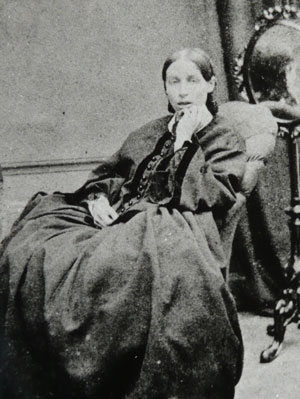
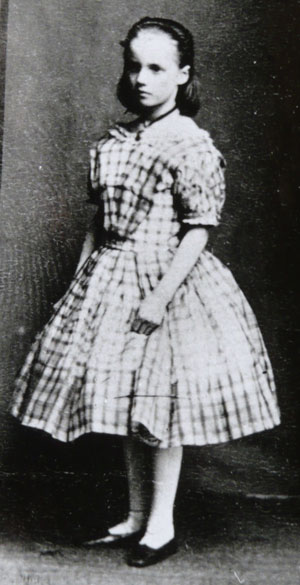
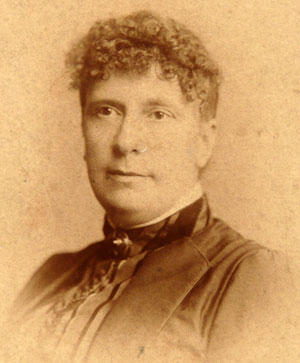
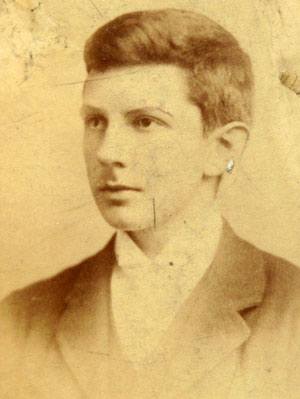
1874, During February I attended the Lords of the Admiralty and officials on the 9th, 12th, 16th, 17th and 20th. On March 3rd, on Lord Camperdown who is leaving, and Sir Massey Lopez who succeeds him.
June, 16th, 17th, 19th, 22nd, 23rd and 24th, I attended at the Admiralty, and for most of those attendances I had to go to London at my own expense and often back to Dilston for only a day or two on necessary business.
30th, again.at Admiralty, long day.
July, 30th, three officials to my office for help in difficulties. August, same taking up my time all day helping them out of mistakes made by Smith's men. 7th, the same over again.
August 10th, Smith and Driver at Dilston to settle lots for sale. August 15th, to Newcastle to meet Smith and Driver, and with them to the Duke of Northumberland's Agent, Mr. Snowball and Solicitors to settle about Royalties.
Sept. 1st. Another day wasted as if I were Mr. Smith's clerk in correcting their mistakes.
Sept. 25th, Sir Massey Lopez came and spent two days with me all over the estates for sale, riding my hunter and being most agreeable and satisfied.
October, 12th, I dined at Mr. Snowball's and met Driver and Smith, after which Mr. Snowball charged us with wanting to sell part of the Dukes estate.
12
I had forcibly pointed out this to the officials, but they thought they knew better than I. Now, however, when threatened by Mr. Snowball they were glad to alter the particulars.
They sold Dilston and other estates at Newcastle,
1875, January, 12th, 13th, 14th at the Admiralty about future management of estates. I am to receive a small percentage of rental and to visit estates frequently at my own expense, only poor pay, but I may take other business.
February I took offices at Grindley's, No. 55 Parliament St.
9th, 13th, 15th and 18th at Admiralty.
April, 10th, at Admiralty about house for new bailiff at Haydonbridge.
May and June with Mr. Le Hunte who made me his Agent, and visiting his estates in Pembrokeshire and settling about farms and quarries and starting agitation about a railway to Fishguard and sea passage to Wexford, which has finally been carried out by opening of traffic from London by Fishguard and Wexford to Cork in September, 1906.
Also during these months working on a Committee at Greenwich Hospital, cleaning out heaps of accumulated papers, sending some to the Public Record Office, some to the Admiralty, including letters from Lord Nelson and others, and one from a Royal Uncle to Queen Victoria, stating that the Royal Dukes had never succeeded in making the Duke of Kent drunk, which we begged they would send to the Queen. In autumn I was employed to make a valuation and report on his estates by Lord Winmarleigh in Lancashire, which occupied some time.
In August, The Hon. W. H. Yelverton made me his agent for his Welsh estates, which was a troublesome business, as he was a crotchetty old man and full of schemes to make money.
December, 8th, I went to Brighton and was introduced to Baroness Mayer de Rothschild, who is a great invalide. On the 9th, after staying at her house I was appointed, by her, general manager and auditor of all her affairs, her estates at Mentmore, farm, gardens and house, and her thoroughbred horse breeding establishment and sales of yearlings at Newmarket, and of house stewards and housekeepers at Mentmore and 107 Piccadilly and Brighton.
I have never had to do with a more gentle and charitable and pleasant employer than she.
12
Dec, 30th, again to Brighton to get instructions about a yacht for the Baroness. Having been elected a member on the Surveyor's Institute, I attended their monthly meetings and took part in the debates, and am still a Fellow, F.S.I.
1876, Jan. 3rd, to Portsmouth, to see Nicholson about Baroness'
yacht. I read a paper at the Surveyor's Institute on " Fences in
Agriculture."
February, 12th, Miss Hannah de Rothschild to whom all the carriages and riding horses of the late Baron were left in charge, gave me instructions to manage them for her, as I found she was robbed by the old coachman.
May, 5th, I was examined by a Committee of the House of Commons on the Newcastle Water Supply.
May, 18th, I was examined by a Committee of the House of Lords on a Railway Bill near Whitehaven.
June, 6th to 10th, and September, 18th and 19th, I was engaged in valuing, and on December, 20th, making report on the value of farms on Lord Carlisle's estate at Castle Howard.
September, much engaged in the building of a new yacht by Mr. Nicholson of Portsmouth for Baroness de Rothschild.
In October I arranged with Cunards for a liner to take the Baroness and her party to the Mediterranean, and had it sent round to Falmouth, where on the 24th, I had the difficult task of apportioning cabins, etc, for such a large party, but succeeded in pleasing all.
1877, Feb. 2nd, I sold Mr. Le Hunt's estate in South Wales by
auction, in lots, with Rule Owen, auctioneer, for £12,255.
During this year I spent 24 days valuing and planning, and reporting on the Earl of Carlisle's estate at Castle Howard as above.
June, 25th, Driver sold by auction, at Haydon Bridge, the cottage property there for £5,275, for which the Admiralty held me responsible, though the Admiralty Officers who attended did not consult me about it.
November, 9th, when in Ireland, I received a letter from an Admiralty clerk requiring my attendance there on the 12th.
On the 12th I attended, and Sir Massey Lopez, the Lord present, made it clear to me that he had not sent for me. A sample of officers plotting against me.
1878, May, 16th to 31st, I had to escort Mr. Loveless, an
Admiralty clerk, all over the Northern Estates, and make him
13
acquainted with all details of management and mode of checking accounts of lead mines and coal mines, etc
Evidently as a preparation for his succeeding me in the management in which he was supplanted by a clerk who had more influence in high quarters
April, 3rd to 20th, engaged taking levels and calculating pumping powers and meeting people interested in reclaiming the Wexford Slob near the mouth of the harbour.
May. 2nd, employed to make a valuation of Horningsea, near Cambridge and valuation,
7th and July, 1st, sending report to Mr. Du Cane the Agent.
May, 7th, got instructions for arbitration on Durnford Bridge estate, near Woking. 10th, very long day on the farm. July, 12th, with the Agent, Mr. DuCane, and on October 9th, engaged on the arbitration.
June, 3rd, with a party of friends, including Walter Creyke, an old Durham man, to Rothampstead, where Sir John Bennett Lawes was most kind in explaining all his agricultural experiments.
June, 13th, over Forest Lodge with agent and reporting, which was afterwards sold.
1879, January. 2nd to 10th, going over delapidations and drains opening them on Ballyfallon, County Meath, for a case, " Collis v. Martley." 16th at Trim Quarter Sessions, when case was adjourned till April. In the meantime met parties on March, 28th and 30th, and on April 1st and 2nd at Kells, when case again adjourned. Again on June 14th and 15th, Quarter Sessions at Navan, where case was ended in favour of Martley my client.
On January, 21st and 30th, and on March, 7th, meetings about Fishguard and Wexford Railway and sea passage, previously mentioned.
June, 24th and 25th, on Special Jury at the Queen's Bench.
December, 7th, when in Ireland I received another telegram from Loveless who knew I was away to attend at Admiralty on Friday. I hurried over and attended on the 13th at the Admiralty, nothing important. While in Ireland this year I judged cattle and sheep at many shows about the country.
December, 12th, Col. Salkeld, of Cumberland, called at my office, and on the 14th went fully into the affairs of his estate near Ovoca, in County Wicklow, which he desired me to take the management of, and for a long time in the succeeding years, he
14
constantly came to my office to consult, and I frequently visited the estate and made valuations and reports, etc.
1879, I continued in Salkelds estate in Ireland and visiting him at Holm Hill in Cumberland, about his affairs, consisting of land, woods and mines in Ireland.
In Feb. I attended three days at an Assize trial, at Newcastle-on-Tyne, about a footpath near Corbridge, whether public by people having been allowed to walk there for recreation. Verdict, it was a public foothpath.
1879, On Feb. 4th, Mr. Stirling Crawfurd came to me to arrange to manage his affairs and those of his wife the Duchess of Montrose, consisting of town property in Glasgow and farms in the district and house in London and at Newmarket, etc. This required my frequent visits and stay in Glasgow till about 1883, when I resigned the agency which was a troublesome one on account of the fancies and vagaries of the Duchess.
1879, in February, I was consulted about the purchase by a proposed Company of Wexford Slob Lands, mentioned before, of many acres which had been embanked from the estuary of the River Slaney. I was for many days engaged with assistants in taking levels and examining the capacity of two pumping engines and the level at which the water could be kept in the open watercourses, and then estimating the probable produce of the land and cost of management. I had meetings with the promoters in London and Wexford. Ultimately they failed to carry out the scheme, and I got no pay for my labour and outlay.
Shaftoes Charity, of which I was a trustee from an early part of my residence at Dilston till the end of 1881. I attended many meetings at Haydonbridge, and in London at meetings with the Charity Commissioners and deputations of leading North countrymen, including the Bishops of Durham at the time. New schools were built and a scheme approved of.
Also from an early time at Dilston, I took an active part with my friend Canon Dwarris, in canvassing the country and attending lectures by him at clubs and collecting subscriptions for the establishment of a middle class school, which was ultimately established at Barnard Castle, as the Northern Counties School, after I had left Dilston ; but in London I attended meetings with the Charity Commissioners about the scheme and application of Flounder's Trust. This school has, I believe, been a success.
15
In 1880 in February, I was much engaged in preparing evidence with Sir Massey Lopez, which he gave on the 19th before the Royal Commission on Agriculture, when I sat beside him to help with documents. On July, 3rd, I was examined by the same Commission of which the Duke of Richmond was chairman. One of them was an Irishman with whom I afterwards became well acquainted, who tried to bully me into making answers to suit his views, and the Duke came to my rescue and stopped him by saying, " Mr. Grey says he is not a prophet."
1880, Aug., 25th, the late Lord Lucan, of Crimean fame, called at my London office, and asked me to undertake some business for him on his County Mayo Estate, which led to my visiting him at his house, at Castlebar, on Sept. 8th, and spending some days in visiting a farm called Cloonagashel near Ballinrobe.
The farm had been held by a Scotsman for twenty years, who could not make up his mind whether to take on a new lease nor not. I spent some days in valuing the farm of over 2,000 acres, and reporting on the condition of the land and fences and two large sets of buildings. While I was there, " The Army," as they say there, came to protect Captain Boycott; hence the word, at which I was at the making of, and has since been used all over the world.
Mr. Simpson, the tenant, having advertised a sale I went there, I spent five days going to, and attending the sale and buying horses and sheep for Lord Lucan, who intended to farm it. I then advertised for a steward and met one in Dublin, who turned out an admirable manager, and was for many years after under the Duke of Leinster. On October, 23rd, I began with Mr. Simpson's arbitrator and an umpire, and I acting for Lord L. in valuing the crop and the growing turnips which was a long affair as the farm was mostly tillage. It occupied us the rest of October, besides meeting afterwards, to make our award for which we were paid.
Then an action began by Simpson for improvements affecting the value. The sum claimed was great, and I advised Lord L. the items he should oppose or have reduced. However, he took some offence and dispensed with my services, and I am told lost his temper at the trial and came badly out of it. From that day till his death he took no notice of my applications for payment for my services, amounting I think to £80 or £90, and I have never
16
received any of it. Owing, I think to the jealousy of his agent and credulity of London Solicitors in believing a Dublin Attorney's statement that I had acknowleged the receipt of full payment, which I had not done.
In October, 1880, I attended the meeting of the Social Science Annual Meeting at Edinburgh, to which I had been specially invited to speak on a paper on Agriculture. It was a farce for Lord Reay, who presided, to allow only ten minutes to each speaker, and I was rung down by his bell when I had merely introduced my reply. The next year I was again asked to attend at another town, I replied, " no, thank you."
1881, This year I was engaged as usual in rushing from place to place in the three kingdoms, visiting the estates under my management, till towards (he end of December, when I was invited to wait on the newly appointed Irish Land Commissioners, who asked me to accept the office of " Court Valuer," the duty being to inspect all farms on which appeals were lodged against the rents fixed by the Sub-commissioners. I accepted the offer thinking it would be permanent, and would confine my work to one set of employers, and that after winding up my work in England and Scotland I should not have to be always crossing and re-crossing the channel. There was some delay by correspondence between Mr. Forster, the Chief Secretary, and the Treasury, which caused me to return to London and visit my friend Lord Lingen at the Treasury. I found him in consultation with Lord Frederick Cavendish at the time, on the question, " Who is this Mr. Gray," my name being misspelt with an A. Lord Lingen at once declared the difficulty settled and reported the approval of my appointment, so in January, 1882, I entered on my duties, but it was soon found that appeals came in so fast that a number of assistants were appointed to work under my guidance, and then I became distinguished by being called the " Chief Valuer to the Land Commission." I was given the appeals in a county and distributing the work received the reports and sent them up to the office. I was frequently called into consultation with my Chiefs on subjects arising till fixed methods could be adopted. Also when fresh candidates came up for appointment as Sub-commissioners to test their qualifications.
During this and the next year I had to keep my office and a competent clerk in Parliament Street, who informed me of any
17
questions arising and to which I was easily able to reply from my intimate knowledge of the English and. Scotch estates, and I had once to attend by leave of my new Commissioners at the final sale of part of the Greenwich Hospital estates. Even there I was held responsible by the Admiralty for any mistakes by their special officials while looking on and not being consulted by them at the sale.
In my Irish work I travelled over every part of Ireland, and my work was always satisfactory till the end of 1893, when the Land Commission was put under the Civil Service, and being then over 65 years of age I had to retire without a pension, and those who remained were entitled to pensions.
I was, however, with one or two more, employed for one year under a different system of work, and a very different rate of pay. This was renewed a second year, so that at the end of 1895 I finally left the Commission.
Having no other employment I retired to my farm near Enniscorthy, where I lived with my family, who had survived, till early in 1905, when I found from bodily infirmity I could not take the same interest in farming. I had bought my farm under the Purchase Act, from Lord Portsmouth, and paid several years installments, and so I sold it and my stock which unfortunately was at a bad time, and I left behind me a heap of money that I had expended in building and improving and highly cultivating the farm.
I then brought my family to this snug little house in a well treed and gardened part of Dublin, where I now live at the age of 81 quietly, though helping the work of the Forestry Society, of which I was one of the original and most active founders. Old as I am, I have fairly good health, though my limbs don't carry me as firmly as they did a few years since. Hardly any of my contemporaries are living, unless Canon Greenwell of Gurham is still alive, as he was the last I heard of him.
I think I should add that while in England, I held many offices besides those mentioned, and which required my attention often two or three in one day and several in a week. I may mention some.
As a magistrate I attended pretty regularly the Petty Sessions and the Quarter Sessions, also the Board of Guardians and the Sanitary Authority when it was established, and the Hexham Highway Board.
18
I was a Governor of Shaftoes Charity at Hayondbridge, and looked after its landed property near Belford, and took an active part in the rebuilding of the schools and obtaining a scheme from the Charity Commissioners.
I was a Director of the Hexham and Alston Railway and of two Steam Cultivation Companies. A Member of the Corbridge Burial Board and settling up a Cemetery. A Member of the Tyne Salmon Conservancy and of the Tweed Salmon Conservancy. A Trustee of the Hexham Turnpike Roads and of the Alston Turnpike Roads leading into four counties, and originally made by McAdam, one of my predecessors in the office of Receiver to Greenwich Hospital, and as mentioned before, an active helper in the foundation of the Northern Counties Middle Class School at Barnard Castle.
C. G. GREY. By mistake I was christened Charles Grey, so I have only one Surname Name. 8 Lansdowne Terrace, Ballsbridge, Dublin.